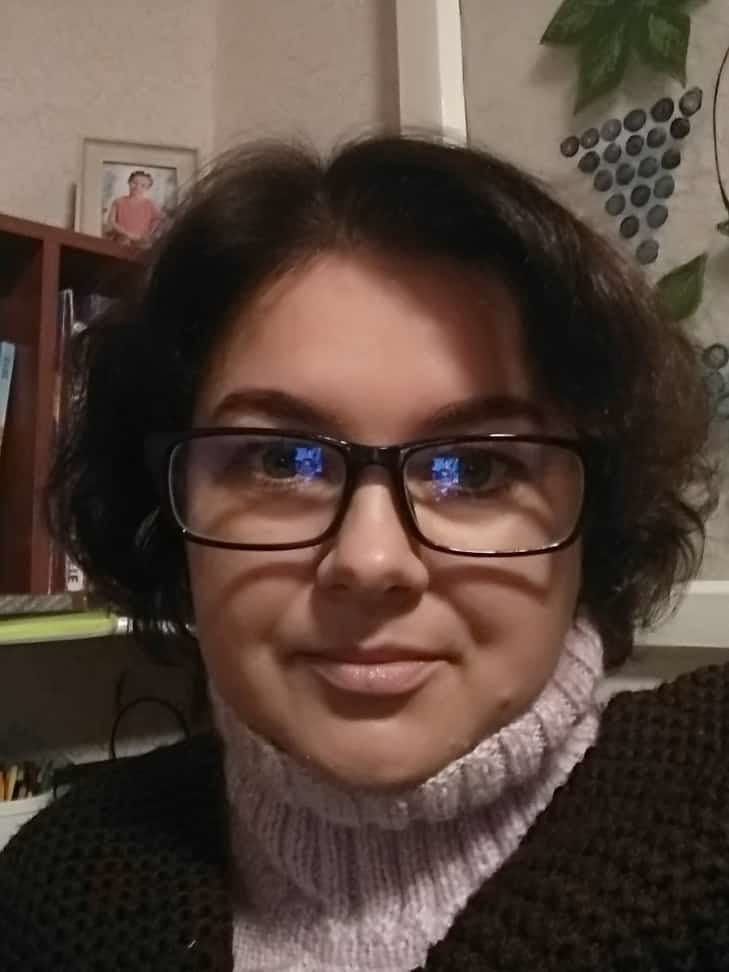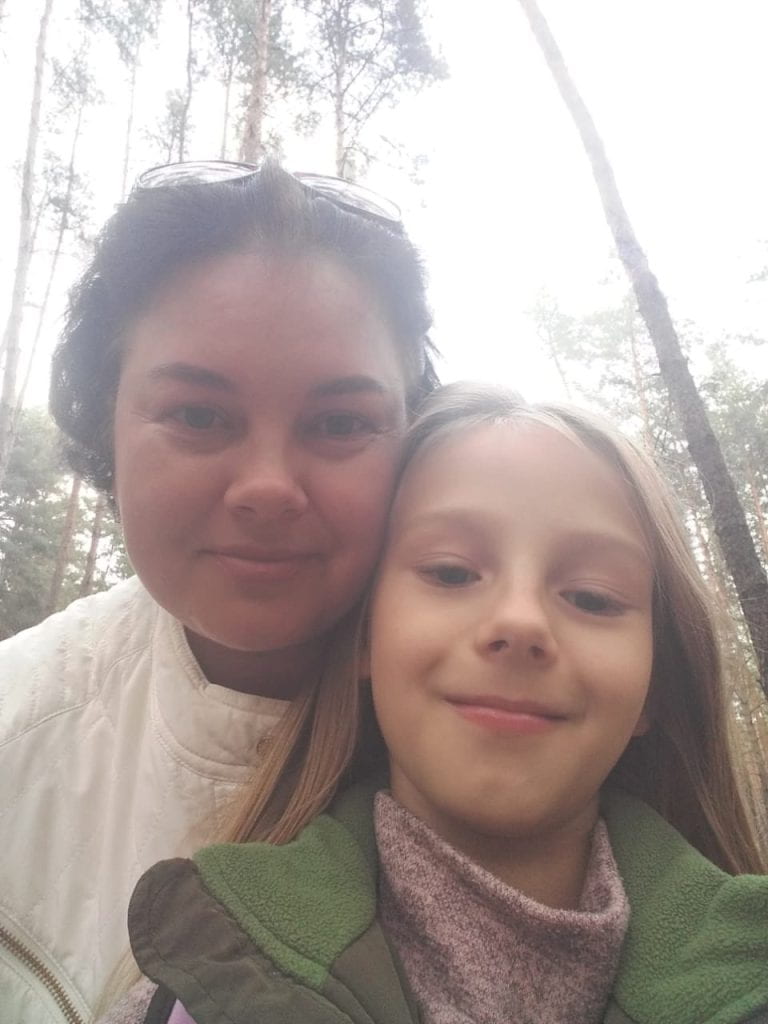How a Ukrainian Servicewoman Returned Her Daughter
By Anna Romandash
“It was shock, and fury, and fear all at once,” says Kseniya, Lebedenko, “I just could not process that they sent my child to Russia.”
Kseniya sighs as she says it: perhaps, to calm herself, or maybe, to shake off the memories of that difficult experience. It’s been a month since she was reunited with her daughter, 11 year old Eva, after nearly a year of separation. She is still very angry about what happened.
“They could not just take her there without my permission,” the woman proceeds, “I almost lost hope.”
Kseniya’s pro-Russian brother brought her child to Russia and refused to return Eva to her mother. Kseniya, a military medic in the Ukrainian army, could not get the child herself.
“I was contemplating about traveling to Russia to get Eva back,” she says, “I knew I might not return, but I’d try and bring her home.”
After months of struggles, Kseniya was finally able to see her child back in Ukraine.

Losing contact
Kseniya is a military medic with Ukraine’s Armed Forces. In her early forties, with a round, motherly face, she is an experienced medical professional who has worked in hospitals for years.
The woman spent most of her life in her native Vovchansk, a quiet little town only 5 miles from the Russian border. Divorced, Kseniya raised her daughter as a single mom with support from her elderly parents. Her brother lived nearby with his wife and two children.
A month before Russia launched its full-scale invasion, Kseniya changed jobs. She moved to Kharkiv, a one-hour drive from her hometown, and became a military medic.
“In late January, I signed my contract, and I started to serve with the Ukrainian army,” the woman recalls.
Her daughter stayed in Vovchansk with her grandparents. As Russians launched their full-scale invasion of Ukraine on February 24, 2022, Vovchansk was one of the first places that fell.
The quiet town turned eerie during the occupation. Russian troops quickly cut off all the communication Vovchansk had with the rest of Ukraine.
“I could not get to them,” Kseniya says, “It was a complete disconnection.”
For months, she tried to reach her family back home, but it was nearly impossible.
“They had no cellphone connection, no internet,” the woman continues, “They barely had any electricity. Whenever I tried to call, I could not get through to them. It was very hard to communicate, very hard to take it in.”
Throughout spring and summer, Kseniya combined her work as a military medic with her attempts to rescue Eva from the occupation.
“I was serving near Izium in the Kharkiv region, and I was looking for ways to bring Eva to Ukraine-controlled territories,” she continues, “But my family was not very supportive of the idea. Basically, they turned pro-Russian while I was serving with the Ukrainian army. I could not communicate with them very much and knew little what was going on, so I could not rescue my daughter.”
By that time, Eva was staying with Kseniya’s brother.
“I was begging my family to give Eva back to me,” Kseniya says, pain in her voice, “I told them I could find volunteers who’d drive Eva to safety in Ukraine. But they didn’t agree.”
Kseniya didn’t know this back then, but her brother supported the occupation. On September 7, he became one of the first locals to receive a Russian passport. The video of him getting the citizenship was widely circulated on the Russian propaganda channels.
“I was really waiting for this moment,” Andriy Lebedenko said to Russian journalists during the citizenship ceremony, “It’s like my second birthday. We are all the same people; we are all Russians.”
A week after Andriy became a Russian citizen, Ukrainian troops liberated Vovchansk.
“They took my daughter to Russia”
Around the time that Russians retreated from her hometown, Kseniya was fighting on another front. With her unit, she was deployed near Bakhmut, where some of the heaviest fighting took place.
“In September, I got wounded. A brain injury,” Kseniya explains, “There was artillery fire against our positions. My phone was destroyed, so I had no contacts, no phone numbers. I could not call my parents right away, and I could not go there because of my injury.”
Kseniya’s acquaintances traveled to Vovchansk to get Eva after the city was liberated. From them, the woman learned that her daughter was not in the country anymore. Andriy took Eva and his family to Russia before Ukrainian forces entered the town.
“I was very angry, and shocked, and afraid,” Kseniya says, “I could not believe they took her out of Ukraine illegally. They had no right to do that without my permission.”
“Why didn’t he go to a territory controlled by Ukraine?” the medic asks bitterly. And, without waiting for an answer, “Well, what’s the point when he already got the Russian passport?”
Through her mother, Kseniya got Andriy’s phone number.
“I started calling him,” she says, “I begged him to let me talk to Eva, but he refused.”
Andriy moved to Belgorod region, not far from the Ukrainian border. He bought a small house there and established his family – and his niece – in a small village two hours away from Vovchansk.
“I asked Andriy to return Eva to me,” Kseniya goes on, “I wanted to talk to her, but he would find all kinds of excuses. This went on for months.”
As soon as the medic was released from the hospital, she resigned from her position to be able to return Eva. Kseniya went to the local police and reported that her daughter was illegally taken to Russia.
The police connected Kseniya with volunteers who focus on returning deported Ukrainian children from Russia.
Since the start of the full-scale invasion, Russia deported at least 12,000 Ukrainian children although Russian sources claim that the number is at least 700,000. Many children are orphans, taken away from their legal guardians and relatives. Some were orphaned recently when their parents were killed during the occupation. Some got separated like Eva.
Russian parliament passed a new law that allows for the speedy adoption of Ukrainian children. According to the Russian authorities, at least a 1,000 of them have been adopted already. Ukrainian guardians are denied information on children’s whereabouts, so unless a child finds a way to communicate with family back home, it is nearly impossible to track and return the kids. Often, when the parents appeal to Russian authorities to get their children back, they get a refusal.
In Ukraine, volunteers help the families return the kids if they already know where they are. Volunteers create the safest route and help with transportation and documents. Most times, relatives have to drive to Russia to get the children themselves.
For Kseniya, this was tricky.
“I served in the Ukrainian army, so I couldn’t go to Russia,” she says, “And my brother did not want to cooperate at all. He didn’t want to return Eva or tell me where they were. I felt like I was failing, and I could not get to him. There were moments when I was on the verge of giving up.”
Eva’s home

Eva was in Russia from September to December. After three months of non-stop calling, Andriy finally agreed to return the child home.
“Volunteers helped me prepare a document that granted power of attorney to another woman who was in a similar situation,” Kseniya explains, “She went to Russia to get her child, and she brought Eva with her.”
On December 17, Kseniya finally saw her daughter.
“I have not seen her for almost a year,” Kseniya says, tears in her eyes, “I don’t remember how we met again. It was just too much for me, so blurry. Too many emotions.”
Mother and daughter moved to Poltava region, in the North of Ukraine. They took Kseniya’s parents with them.
“We cannot go back to Vovchansk now,” she explains, “It is too dangerous because there is constant shelling from the Russian side. The town is on the verge of humanitarian catastrophe.”
In their new home, Kseniya takes care of her parents and spends as much time as she can with Eva. She doesn’t talk to her brother anymore.
“There is nothing I have to say to him,” she sighs, “We have very different values. I don’t know how he could sell his country like that. It is bad, and it upsets me very much that this happened to my family. I don’t know how it happened, but it did.”
Kseniya hopes to return to the Armed Forces soon. But for now, she’s staying home; Eva and her parents need her.
“I am very happy she is home,” Kseniya says, “I was afraid she’d not return. But now, she is here, and everything will be all right.”
Anna Romandash is a Ukrainian freelance journalist and 2022 Research Affiliate at the Mgrublian Center for Human Rights at Claremont McKenna College
